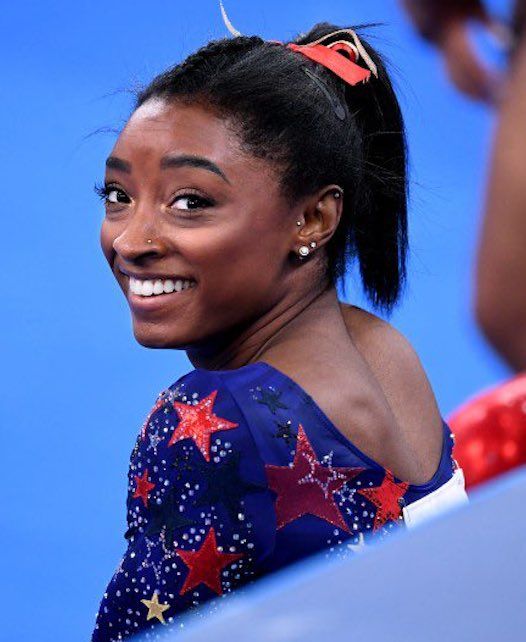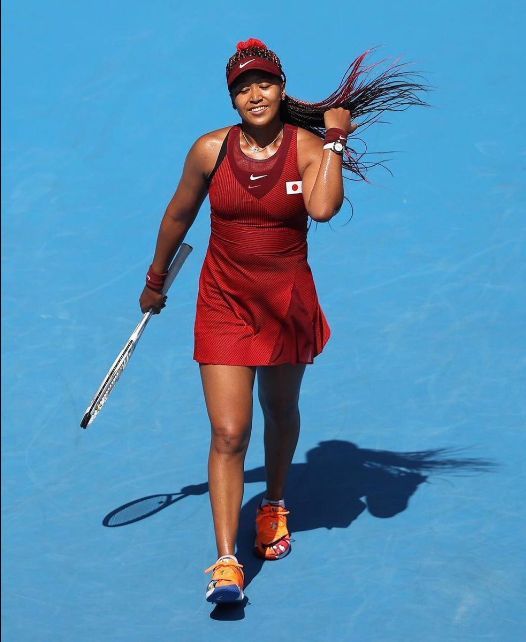At the end of the day, we’re human, too, so we have to protect our mind and our body rather than just go out there and do what the world wants us to do.
Simone Biles
Simone Biles is 24 years old, the most decorated American gymnast (with 30 Olympics and World Championship medals), and is regarded as the greatest gymnast of all time. This week in Tokyo, her decision to drop out of both the US team competition and the individual all-around competition stunned the world.
Biles’s decision follows a similar step back taken by tennis star Naomi Osaka earlier this year when she withdrew from both the French Open and Wimbledon to focus on her mental health.
When asked about Osaka in a press conference on Tuesday, Biles said she was inspired by Osaka’s example and that she would tell others who are struggling to prioritize their own needs.
“Put mental health first, because if you don’t, then you’re not going to enjoy your sport and you’re not going to succeed as much as you want to,” she said. “So it’s OK sometimes to even sit out the big competitions to focus on yourself, because it shows how strong of a competitor that you really are, rather than just battle through it.”
Why Winning Doesn’t Always Equal Success
Watching Biles’s press conference, I found myself recalling the TEDWomen talk that former UCLA Women’s Gymnastics Team coach Valorie Kondos Field gave in 2019. “Winning is really, really fun, but winning does not equal success,” she told the audience. “I’m calling for a time-out. Time-out. We need to redefine success. Real success is developing champions in life for our world, win or lose.”
TEDWomen 2019
During her 29 years as coach, Kondos Field came to the realization that, as she says, “I needed to fortify our student-athletes as whole human beings, not just athletes who won.” This changed her definition of success and her coaching philosophy, which is developing champions in life through sport. She talked about Katelyn Ohashi, a gymnast on her team who came to her team “broken in body, mind and spirit.” For Katelyn, “winning at all costs had cost her her joy. ….My job was to figure out how to motivate her to want to be great again, by helping her redefine success.”
“First and foremost I cared about her as a whole human being. …I encouraged her to find things outside of her sport that brought her joy. And it was so cool to see the process of Katelyn Ohashi literally blossom before our eyes. And through that process, she rediscovered her self-love and self-worth. And slowly, she was able to bring that joy back to her gymnastics.”
The Gift and Power of Emotional Courage
When we think about the year that we have all just been through — the pandemic; the resulting disconnection from friends, family and support systems; the enormous grief and suffering of those who contracted Covid or lost loved ones; a racial reckoning; a divisive and contested election; an attack on our Capitol; and a now a summer of extreme weather events that are unrelenting — is it any wonder that we all might be feeling exhausted, stressed-out and disoriented?
In 2017, psychologist Susan David spoke about the gift and power of emotional courage in her TEDWomen talk. It’s one of the most popular TEDWomen talks of all time with more than 9 million views. It’s a good one to revisit for all of us who are looking to thrive in 2021.
“Normal, natural emotions are now seen as good or bad,” she says. “And being positive has become a new form of moral correctness. People with cancer are automatically told to just stay positive. Women, to stop being so angry. And the list goes on. It’s a tyranny. It’s a tyranny of positivity. And it’s cruel. Unkind. And ineffective. And we do it to ourselves, and we do it to others.”
For Biles, trying to battle through it could also be deadly. “Not being in the right headspace when attempting difficult stunts could very easily result in severe injuries or even death,” writes Natalie Harmsen at MSN. “By prioritizing her mental health, Biles is looking out for her safety while also spotlighting the fact that mental health is health.”
“We’re human beings. Nobody is perfect. It’s OK to not be OK. It’s OK to go through ups and down and emotional rollercoasters,” Olympic champion Michael Phelps commented on NBC. “The biggest thing is, we all need to ask for help when we go through those times. … It was hard for me to ask for help.”
“[T]he radical acceptance of all of our emotions,” says Susan David, “even the messy, difficult ones — is the cornerstone to resilience, thriving, and true, authentic happiness.”
We Don’t ‘Move On’ From Grief, We Move Forward With It
The last talk I want to share may seem a little off-base, but I don’t think it is. In 2018, writer and podcaster Nora McInerny talked about the importance of becoming comfortable with the uncomfortable — other people’s grief. In this year, when so many of us are dealing with grief, I believe there’s a kind of existential grief that we are all processing.
As Nora observes, “We need to remember that a grieving person is going to laugh again and smile again. If they’re lucky, they’ll even find love again. But yes, absolutely, they’re going to move forward. But that doesn’t mean that they’ve moved on.”
We need to listen to ourselves, own our feelings and be kind — not only to ourselves, but to others who are going through struggles we may not understand.
Self care is not selfish. Prioritizing mental health is not a weakness. And asking for help is courageous.
I believe that the examples of Simone Biles and Naomi Osaka are something that we should honor and practice in our own lives. As Susan David says in the conclusion of her TED talk, “in seeing yourself, you are also able to see others, too: [it’s] the only sustainable way forward in a fragile, beautiful world.”
Onward!
– Pat




